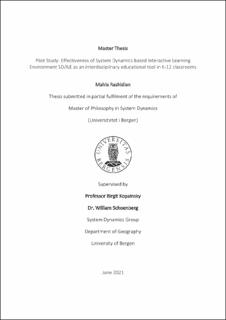| dc.description.abstract | Systems thinking is a methodology used to explore and understand the interrelationships within complex systems. One of the key concepts in systems thinking are the feedback loops. This research aims to assess the effectiveness of an SD/ILE (System Dynamics-based Interactive Learning Environment) as an interdisciplinary educational tool for K-12 students, to help them develop systems thinking skills and build lateral understanding on feedback loop processes. While the concept of feedback loops is far-reaching and present in many disciplines as well as day-to-day life, this ILE references the carbon cycle as a complex system. In this study we chose to develop a lesson about “Carbon Cycle” for two reasons: first, it is part of the US high-school biology curriculum, and second, due to the current environmental crisis, it is important to learn about climate feedbacks and to provide a real-world context. This is an empirical research project based on observation of students’ learning outcomes in a pilot session. During this session, students were provided with guidelines, the online links to the ILEs and challenges to complete both individually and in teams under their teacher’s supervision. The session took place in a US high-school biology class. The obtained results through the pilot test and analyzed data, show promising increase in students’ learning curve after playing the Carbon Cycle games in comparison with the pre-test results. Evaluation of students’ understanding, and page time tracking data reveals that learning curve has a high correlation with the average time that each student spent playing the game. Moreover, the data supports the positive impact of animation-based design in the students’ learning curve along the game. Also, this pilot session provides a useful overview of challenges for real-world experiment setup and limitations of available systems thinking skills measurement tools in real-world classroom experiments. The challenges are related to different aspects of the experience, such as the teachers’ role, interactive and engaging level of the ILE (game) design, appropriate timing for playing the game, easy instruction, and suitable assessment tool for measuring individual knowledge development. Among the strongest lesson learned from the classroom experiment, time management, and students’ engagement can be underlined. | |

